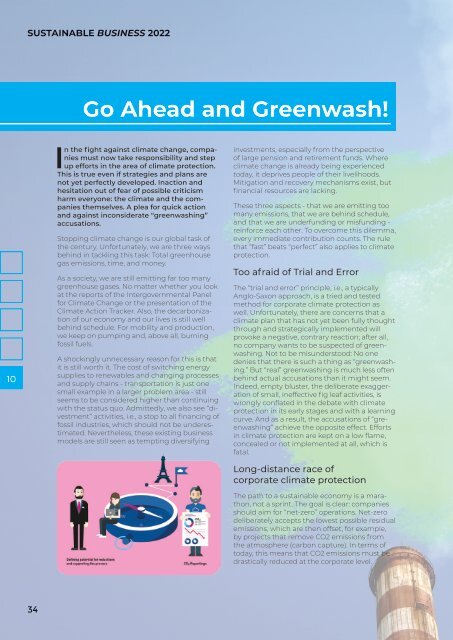EDM Sustainable Business 2022
EDM Business editions represents the board-level conversation in multichannel retail focussing commercial growth and connection with the digital, demanding consumer.
EDM Business editions represents the board-level conversation in multichannel retail focussing commercial growth and connection with the digital, demanding consumer.
You also want an ePaper? Increase the reach of your titles
YUMPU automatically turns print PDFs into web optimized ePapers that Google loves.
SUSTAINABLE BUSINESS <strong>2022</strong><br />
Go Ahead and Greenwash!<br />
10 5<br />
In the fight against climate change, companies<br />
must now take responsibility and step<br />
up efforts in the area of climate protection.<br />
This is true even if strategies and plans are<br />
not yet perfectly developed. Inaction and<br />
hesitation out of fear of possible criticism<br />
harm everyone: the climate and the companies<br />
themselves. A plea for quick action<br />
and against inconsiderate “greenwashing”<br />
accusations.<br />
Stopping climate change is our global task of<br />
the century. Unfortunately, we are three ways<br />
behind in tackling this task: Total greenhouse<br />
gas emissions, time, and money.<br />
As a society, we are still emitting far too many<br />
greenhouse gases. No matter whether you look<br />
at the reports of the Intergovernmental Panel<br />
for Climate Change or the presentation of the<br />
Climate Action Tracker. Also, the decarbonization<br />
of our economy and our lives is still well<br />
behind schedule. For mobility and production,<br />
we keep on pumping and, above all, burning<br />
fossil fuels.<br />
A shockingly unnecessary reason for this is that<br />
it is still worth it. The cost of switching energy<br />
supplies to renewables and changing processes<br />
and supply chains - transportation is just one<br />
small example in a larger problem area - still<br />
seems to be considered higher than continuing<br />
with the status quo. Admittedly, we also see “divestment”<br />
activities, i.e., a stop to all financing of<br />
fossil industries, which should not be underestimated.<br />
Nevertheless, these existing business<br />
models are still seen as tempting diversifying<br />
investments, especially from the perspective<br />
of large pension and retirement funds. Where<br />
climate change is already being experienced<br />
today, it deprives people of their livelihoods.<br />
Mitigation and recovery mechanisms exist, but<br />
financial resources are lacking.<br />
These three aspects - that we are emitting too<br />
many emissions, that we are behind schedule,<br />
and that we are underfunding or misfunding -<br />
reinforce each other. To overcome this dilemma,<br />
every immediate contribution counts. The rule<br />
that “fast” beats “perfect” also applies to climate<br />
protection.<br />
Too afraid of Trial and Error<br />
The “trial and error” principle, i.e., a typically<br />
Anglo-Saxon approach, is a tried and tested<br />
method for corporate climate protection as<br />
well. Unfortunately, there are concerns that a<br />
climate plan that has not yet been fully thought<br />
through and strategically implemented will<br />
provoke a negative, contrary reaction; after all,<br />
no company wants to be suspected of greenwashing.<br />
Not to be misunderstood: No one<br />
denies that there is such a thing as “greenwashing.”<br />
But “real” greenwashing is much less often<br />
behind actual accusations than it might seem.<br />
Indeed, empty bluster, the deliberate exaggeration<br />
of small, ineffective fig leaf activities, is<br />
wrongly conflated in the debate with climate<br />
protection in its early stages and with a learning<br />
curve. And as a result, the accusations of “greenwashing”<br />
achieve the opposite effect. Efforts<br />
in climate protection are kept on a low flame,<br />
concealed or not implemented at all, which is<br />
fatal.<br />
Long-distance race of<br />
corporate climate protection<br />
The path to a sustainable economy is a marathon,<br />
not a sprint. The goal is clear: companies<br />
should aim for “net-zero” operations. Net-zero<br />
deliberately accepts the lowest possible residual<br />
emissions, which are then offset, for example,<br />
by projects that remove CO2 emissions from<br />
the atmosphere (carbon capture). In terms of<br />
today, this means that CO2 emissions must be<br />
drastically reduced at the corporate level.<br />
34


